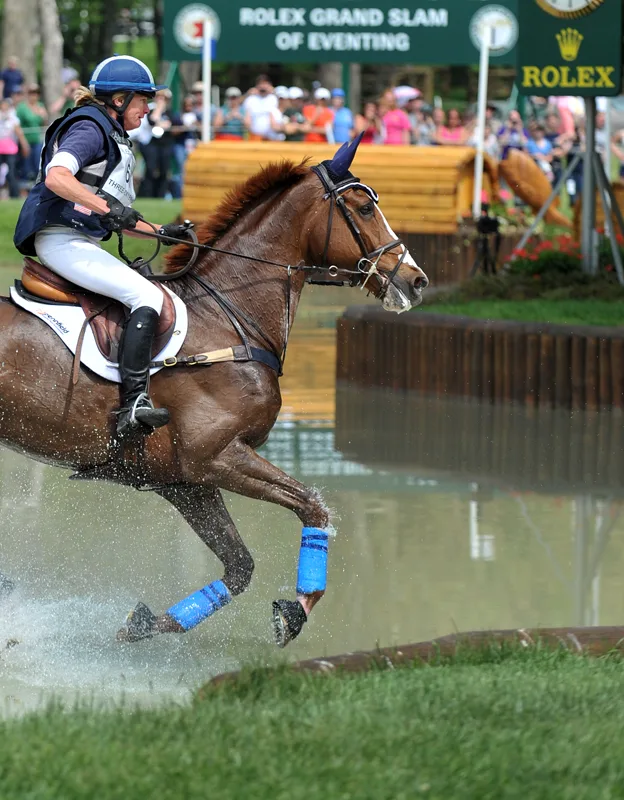August 19, 1949
Choosing a team for the Olympic Games was as much a hot topic in 1949 as it is in 2012. Once civilians were allowed to compete in the Olympic Games, the U.S. selectors struggled to find the best way to form teams without the help of the Army.
The announcement last week that the Duke of Beaufort would again make Badminton available for the English Olympic Trials next spring should be an added spur to those who have not yet decided whether they will or will not help plans of the United States to single out Olympic material to represent this country in the 1952 Olympics. To date the most concrete plan for the selection of a team has been put forward by Brooks Parker of Philadelphia. This includes, unless something goes very much awry, a 3-day event for Olympic prospects to be held concurrently with Bryn Mawr-Chester County Horse Show at the Devon Show Grounds, September 22,23,24.
The first day is a schooling test, the second day, endurance, speed and cross country tests which will be held over the Radnor country adjoining the Radnor Hunt Meeting course, and presumably over some of the timber fences on the course, although this is suppositional only. The last day will be the jumping test and will be back again at the Devon Show Grounds. As the English and other countries, who have already a program well under way, are doing, such an initial test, is the first of a number of trials which will eventually sort out the quality and caliber of horses and the amateur American riders to represent their country.
The program to develop an American international jumping team from among the many thousands of horses and horsemen between now and 1952 is not insurmountable. It’s great drawback is that heretofore, the Army has always done it and so in spite of the fact that there just isn’t an Army to do it, the general public and horsemen in particular, just refuse to believe the Army still won’t do it. There has, however, been no indication that the United States will put an Army team into action. As a matter of fact, they do not have the horses to choose from any longer, an Army team just does not exist.
A first class equestrian team would bring great credit to this country abroad, but this country’s propaganda activities are hopelessly inept. Propaganda, along with espionage, is considered here as some legerdemain practice not seemly for a true democracy.
ADVERTISEMENT
Horsemen, therefore, have a patriotic duty, as well as a job as horsemen, to develop a first rate, winning Olympic team. Individually and collectively, there is probably no better job that each one could do for his country than as horsemen, to help put a winning team into the Olympics. Propaganda is very much the same as public relations and advertising. Its box score is measured by the number of times the product, in this instance the accomplishments of the United States of America, is rung up for the rest of the world to see. As the nations of Europe are all more horse minded than mechanized and automobile crazy America, the feats of equestrians and their horses, mean even more abroad than they do in this country.
As has been proposed before in these columns, by adding 50c to each horse show entry, exhibitors could go a long way toward paying the expense of an Olympic team. The Bryn-Mawr-Chester County Show has already included this plan in its prize list this fall, and it is hoped other shows will do the same. As a matter of fact, the whole civilian Olympic plan can be comparatively simple if those with good jumping horses would get behind it. There is plenty of good material, plenty of men who can instruct riders and horses.
In this connection the Olympic committee ought not to overlook the possibility of including women riders. They are in many instances superior to men as horsemen and their amateur standing, incidentally, might be easier to establish, in case women are allowed to participate in the 1952 equestrian event as part of the American team.
Now is the time to put together our first civilian Olympic team. Everyone’s shoulder should be at the wheel. The commodity needed is good Thoroughbred blood of substance and stamina. Our horsemen are legion: instruction is available on the best foreign methods as well as our own cavalry school technique: an Olympic team needs patriotic men, sufficient money and good horses. Can anyone say America is lacking in these? It is but short of one thing. Time is now the essence. Time to organize, develop and train.
This article was first published on August 19, 1949, in The Chronicle. It’s part of a series celebrating 75 years of Chronicle history.







